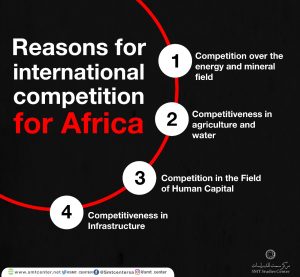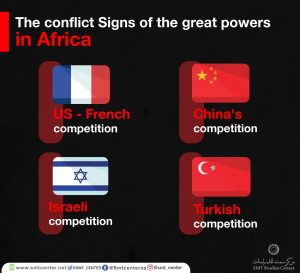Subscripe to be the first to know about our updates!

The hegemony policies of the great powers in Africa.. Signs and properties
There are international controversies about the conflicting position of the major states and blocs of hegemony in Africa. After the African countries gained their independence and the realization of the “political kingdom” – in the words of Kwaminkruma – the international response to the resources of the natural continent took on another form, In the context of Cold War politics and the ideological confrontation between the capitalist and socialist camps, the African continent was the victim.
After the ended of the Cold War, international policies took a new twist in the new globalization, “America” policies, and once again the big powers were relegated to the areas of wealth and influence on the African continent, especially after the last of September 11 in the United States. In the new American strategic thinking, which is what we are trying to clarify the policies of the US-European competition and its machinations on the African interior.
Reasons for international competition for Africa
It is based on the classical colonial style and the adaptation of the modern imperialist regimes of the international powers after emptying them from the Middle East and re-linking them to the African continent. This may lie in the huge wealth that attracts the major countries looking for new energy and natural reservoirs, as well as markets for marketing their products and services. International competition in the continent on:
(1) 1. Competition over the energy and mineral field
Africa is characterized by enormous hydroelectric power, with 1,750 terawatt hours, and although its energy security can be assured through hydropower generation, it uses only 5% of this potential, although it represents 12% of the energy potential. Hydro-electricity.
As for solar energy, the conditions for electricity production are available in many African countries because of the strong sun. “Greenpeace”, the organization of environmental protection, reported that the construction of solar power plants in 2% of the desert area , (2)Enough to cover the global need of electricity.

With regard to the classical energies of oil and gas, the continent is the last region of the world with a huge reserve of both materials, and experts estimate the size of African oil between 7 and 9% of the total world reserve, equivalent to 80 to 100 billion barrels of crude.
In the same context, the African continent is characterized by the availability of large quantities of uranium material in the core of nuclear industries, where the continent produces more than 18% of the total world production of uranium, and studies indicate that possession of one third of the world reserves of this important material.
2. Competitiveness in agriculture and water
Agricultural investment is one of Africa’s best options for investors from the international community to contribute to economic growth and food security in Africa and the world. Africa has a huge water resource with 13 rivers, high rainfall, especially in the tropics, Groundwater, with an estimated irrigation potential of more than 42.5 million hectares
3. Competition in the Field of Human Capital
With a population of about 934 million, making it a huge consumer market, especially as most of the countries delay the achievement of human welfare rates to a minimum, and the weakness of per capita income in most of these countries may be motivated to focus some of the industries and activities of transnational companies in them With a view to reducing the cost of production. And to benefit from human capital, which will be necessary for these companies and behind the States or the superpowers controlled by these companies, to invest in the field of human development, which is still limited, despite the interest of some investors in the development of civilizational society, environment and health, And raise awareness and capacity through (3) education and training.
4. Competitiveness in Infrastructure
Civil wars have contributed to the delay of building the countries of most African countries to find themselves to this day lacking the most basic elements of civilization, especially in the field of infrastructure with different manifestations.
This delay has made Africa a great arena for building dams, airports, railways, hospitals, universities and mines, hundreds of mega projects that can only be made by large companies for exploitation partnerships that may take decades. Foreign companies carry out these projects at full cost sometimes to take advantage of these Projects in a manner negotiated before starting.

The conflict Signs of the great powers in Africa
With the end of the Cold War, the logic of international competition on the African continent once again prevailed among the major poles of the international system: the United States, Europe, Japan and China, as well as the regional ones: Turkey, Iran and Israel, with the aim of exploiting the continent’s wealth and natural resources. Theoretical studies have pointed to the fact that the United States and some European powers, particularly France, are competing for influence and control in Africa. In reality, there is a kind of understanding between these forces, as shown by French-American cooperation in the fight against terrorism In Africa For example, the implications of that conflict can be illustrated by:
- US – French competition: Despite the ongoing cooperation in the field of combating terrorism, but in fact there are competing US- French in Africa, can be translated into “Francophone and Anglophone”, as well as the economic and oil interests of the conflict.
In 1992, the Congolese President Pascal settle for French oil company headed “A” and asked for his help in bridging the deficit experienced by his country’s budget in that year, and when he met with a refusal directed to Occidental Petroleum, which offered him $ 150 million in exchange for ceding some oil fields Which caused a “cold war” between France and America ended with the removal of the American company, and the French province of the oil concessions in the Congo.
In contrast, the same scenario in more than one occasion and in more than one African country repeats; in Gabon in 1990, and Chad in 1992 and Angola in 1993, with the French almost wasting oil their privileges and needed subject down a heavy French state to install its situations where.
The evolution of the US-French conflict to become “agents” conflict, on the background of the dispute between Cameroon and Nigeria in 1994, and their conflict about Bakasha Island, France has stood by Yaounde in the face of the Abuja Anglo-Saxon in the reality of the conflict within the circle of French influence in Africa, and the analogy of many of internal conflicts in Africa(4(.
- China’s competition: China has embarked on a foreign policy that differs from the American-French model, based on non-interference in internal affairs, the lack of linking investment to preconditions, and the non-broadcasting of any ideological, intellectual or cultural pattern that is in the process of smearing African identity. , Making China one of the most favored allies of African systems, and used the economic and trade paper to support those policies.

- Israeli competition: In Africa, Israel finds an opportunity to support and support it in international forums, such as the United Nations and the Security Council, especially with regard to its conflict with the Palestinians. It has pursued diplomatic and economic policies to ensure engagement with the African interior. The increase in the number of Israeli trade attachés in Africa, Based on the consolidation of Israeli moves to compete and dominate in Africa.
- Turkish competition: Turkey is one of the key players in the quest for hegemony in Africa, led by Turkish President “Recep Tayyip Erdogan”, where he visited the war-torn Somalia three times, which led to the acquisition of Turkish companies to major contracts, and strengthened relations between officials Politicians in Turkey and Somalia, as well as the recent Turkish moves in Sudan aimed at strengthening Ankara’s status in the Red Sea by dominating the island of Suakin and legitimizing the Turkish presence in East Africa.
- Iranian Competition: Iran has adopted a range of soft policies that have helped to penetrate Africa, including development assistance in the areas of technology, energy, oil exploration and petroleum exploration, oil refinery maintenance, petrochemical and gas industries, Dams, as well as oil exports to African countries at cheap prices compared to the global market.
These policies contributed to the growth of trade between Iran and African countries. At a joint trade meeting between Africa and Iran organized in Tehran, the Director General of Arab and African Affairs at the Chamber of Commerce, Industry, Mines and Agriculture of Iran, Shahram Khayyubour, announced that Iran and South Africa The prospects of trade to reach about two billion dollars in 2021.
The repercussions of the international competition on Arab-African relations
The policies of competition and movements of hegemony of the major countries within Africa reflect the decline in the development of Arab-African relations according to a number of indicators, including:
- Anglo-American behavior supports the ruling minorities of Rwanda, Burundi and Uganda, and the creation of spheres of influence in the Greater Horn of Africa jeopardizes Arab interests, which may serve as a pressure bar In the water file in the face of both Egypt and Sudan.
- The American presence is always linked to the Israeli presence. It seeks to open a gap in the Arab national security and water lines, as well as protect American interests in Africa.
- These international forces are working on different agendas to raise issues of division and conflict between Arabs and Africans, and this is evident in the American and European position on the issue of political Islam, which is described as terrorism, which entrenched the US move to bomb the “Al-Shifa” pharmaceutical factory” in Khartoum under the “Terrorism”, and the isolation of the sponsor state.
Political studies unit *
Resources
1 – د. نيفين حليم: التنافس الدولي لكسب النفوذ في إفريقيا، صلاح سالم زرنوقة (مشرف): العرب وإفريقيا فيما بعد الحرب الباردة، جامعة القاهرة، مركز دراسات وبحوث الدول النامية، قضايا التنمية، عدد 18، 2000م.
2 – إفريقيا قادرة على توفير الطاقة الكهربائية للعالم، علوم ، مارس 2017. https://goo.gl/FaYCVb
3 – حمدي عبدالرحمن حسن، سياسات التنافس الدولي فى إفريقيا، قراءات إفريقية، فبراير 2013. https://goo.gl/iNAkPV
4 – الاستعمار الفرنسي في إفريقيا .. اضمحلال الدور وأفول الفرانكوفونية، سبتمبر .2010 https://goo.gl/EZC3b6